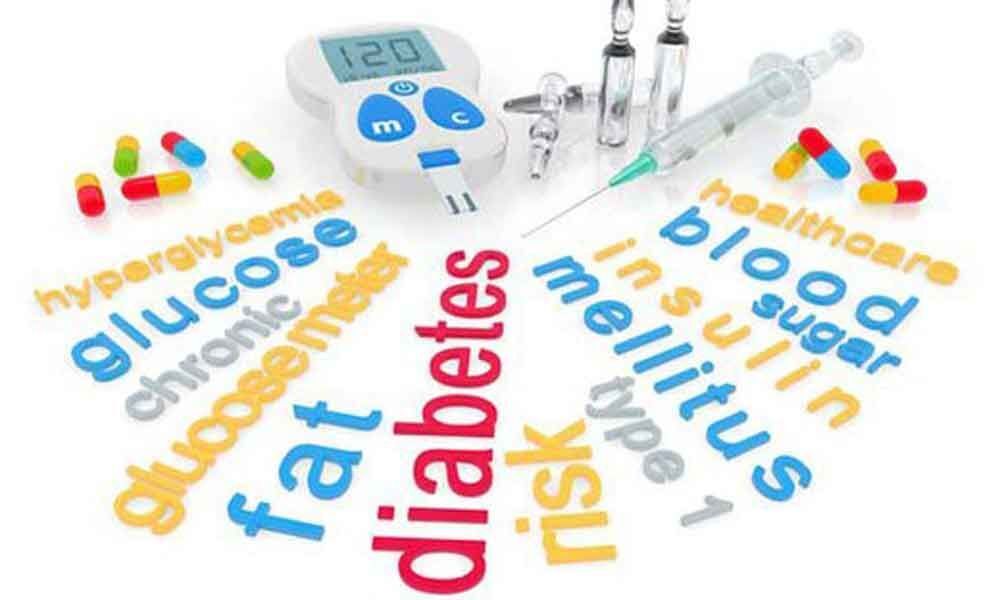Live
- ROB ready by March-end
- 30.1-9-49-10 – Anshul Kamboj picks up all 10 wickets in Haryana vs Kerala Ranji Trophy match
- South Korean FM Cho, Blinken hold talks on margins of APEC summit in Peru
- India’s insurance sector growth surpasses China, Thailand: McKinsey
- CLOSE-IN: Indian cricketers from Paupers to Princelings
- Delhi-NCR's air quality remains hazardous for residents
- South Korea, US, Japan to announce establishment of trilateral secretariat this week
- North Korean leader Kim orders mass production of suicide attack drones: KCNA
- Calcutta HC to hear next week plea for CBI probe into death of Jhargram Hospital doc
- Nigeria reports 15,000 AIDS-related deaths annually: Official
Just In
Diabetes India launches the 1000 Days Initiative


January will mark 100 years of insulin use, when a young boy dying from diabetes was given the first insulin injection.
Lakdikapul: January will mark 100 years of insulin use, when a young boy dying from diabetes was given the first insulin injection. Setting a 1000-day countdown to the date, the Research Trust of Diabetes India (Diabetes India) has launched its '1000 Days Initiative' to intensify diabetes control and management efforts in the country.
Back in 1922, the first insulin injection was given to a young boy Leonard Thompson by Banting and Best, and their team.While it did not work immediately, they worked relentlessly to develop another solution which within 15 days dramatically brought down the boy's blood sugar levels. Today however, despite many advancements made in diabetes care, the growing knowledge and development of modern medication, the management of diabetes in India remains dismal.
Commenting on this scenario, Dr SM Sadikot, President DiabetesIndia and former president of International Diabetes Federation said, "India has 74 million people with diabetes and over 57% of these people do not even know they have the condition. And another 50% do not have their diabetes under control. Through the 1000 Days Initiative I would like to make the entire medical community face these problems head on and work to bring diabetes under control in India by 2022."
The 1000 Days Initiative will bring together leading endocrinologists and diabetologists across India to create clinical guidelines and provide recommendations on how to ensure early diagnosis of diabetes, monitor HbA1c levels, encourage lifestyle changes, reduce tertiary complications and manage existing complications for Type 1 and Type 2 diabetes more efficiently. It targets to reach close to 50,000 general physicians and family physicians since 95% of people with diabetes are managed by their family/general physicians (GPs) to improve diabetes consultations, treatment and care and to bring down the current average HbA1c levels by 1% - from 9.2 to 8.2.
During April 18-21, DiabetesIndia will also hold walkathons across the country with local doctors to raise awareness on diabetes care and the need for a healthy lifestyle to tackle the chronic condition. DiabetesIndia will also reach out to more than half a million families in India through education initiatives and knowledge-sharing activities on diabetes.
Dr Sadikot added that diabetes is the leading cause of lower limb amputations, second only to accidents. It is also the largest cause of legal blindness. One in three or more people undergoing haemodialysisor kidney transplants have diabetes and more than 50%-60% of Indians with diabetes may die at least 10-15 years earlier from cardiovascular complications. He stressed the need for concerted action and relentless efforts, much like Banting and his team, to find new solutions to bring diabetes under control in India.

© 2024 Hyderabad Media House Limited/The Hans India. All rights reserved. Powered by hocalwire.com






